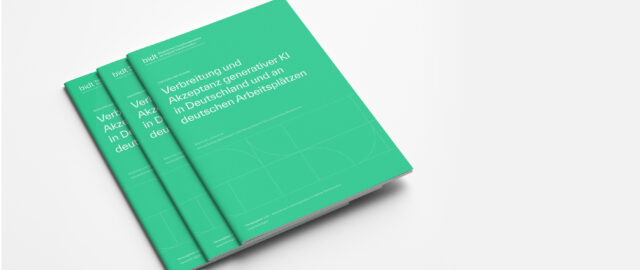A study by the Bavarian Research Institute for Digital Transformation (bidt) of the Bavarian Academy of Sciences and Humanities shows how generative artificial intelligence is used and perceived, particularly in an educational context. On behalf of the bidt, the market research institute DCORE surveyed 3,020 internet users in Germany in July and August 2023, including 252 school pupils aged 18 and over and 981 students aged 18 and over.
You can find the complete study here:
Three quarters of the students surveyed use generative AI
The younger generation is more familiar with generative AI than the rest of the population. While 92 per cent of adult pupils and 98 per cent of students have already heard of the technology, the figure is 77 per cent among the remaining internet users surveyed. However, the differences are even more pronounced when it comes to usage. Only a quarter of respondents who do not attend school or university have already used generative AI. In contrast, around three quarters of school pupils (73 per cent) and students aged 18 and over (78 per cent) have already used the technology. Overall, male students use it more frequently than female students.
Time savings and better grades – even without corresponding performance
The perceived influence of generative AI on grading is astonishing: four out of ten adult pupils (42 per cent) and 45 per cent of students believe that they have received better grades thanks to generative AI without having performed adequately. On the other hand, half of the students surveyed also agree with the statement that the use of generative AI at school or university leads to an increase in performance. Overall, both adult pupils and students recognise the benefits of the technology. For the most part, they were able to utilise the generated results in a meaningful way, learn more easily and save time by using generative AI. While ChatGPT and co. tend to be used at school for text summaries (68 per cent), the main purpose for students is research (59 per cent).
Interest in deeper understanding increases with level of knowledge
Just because students know and use generative AI does not necessarily mean they understand the technology. Only around half of the students surveyed who have at least heard of generative AI state that they understand its basics. However, it is also clear that the more frequently learners use generative AI, the more likely they are to understand the technology. In addition, around half of the pupils (45 per cent) and students (57 per cent) surveyed would like to understand generative AI systems better. However, those with a better understanding of the technology would like to deepen this knowledge even further.
Critical debate still has room for improvement
There is still some catching up to do when it comes to risk awareness: No more than 50 per cent of the pupils and 56 per cent of the students surveyed are aware that generated results can be factually incorrect. Critical analysis is also only partially present: Less than two out of three pupils (59 per cent) and students (58 per cent) check the correctness of the results of text-based generative AI in the context of school or university. In comparison: in a professional context, the figure is 70 per cent among non-student employees.
Antonia Schlude, research assistant at the bidt Think Tank, emphasises:
A significant proportion of learners are not aware that generative AI can deliver incomplete, unbalanced or contradictory results. This makes it all the more important to highlight these limitations and promote the technology and media skills of learners and teachers.
 Antonia Schlude To the profile
Antonia Schlude To the profile
Desire for guidelines, controlled examination formats or even a ban
There is also a lack of knowledge among some teachers. For a third of adult learners who have used text-based generative AI at school or university, the teaching staff were unaware of its use. In addition, 54 per cent of pupils and 41 per cent of students aged 18 and over report that there are no guidelines at their educational institution. If regulations are in place, they are mostly adhered to (61 per cent). If there are no regulations, 44 per cent of the pupils and 57 per cent of the students surveyed would like to see them. As many as 47 per cent of students are in favour of more controlled examination formats, while a third (31 per cent) are even in favour of a ban on generative AI.
Major challenges for the German education system
The majority of students realise that the use of generative AI will pose major challenges for the German education system. An important task is to keep pace with the rapid development of the technology and to react quickly with suitable measures.
Roland A. Stürz, Head of Department at the bidt Think Tank and head of the study, sees a need for action at various levels:
Generative AI is putting the German education system under massive pressure. Educational institutions must become more flexible and agile and educational policy measures must be taken: Clear regulations, skills development and adequate performance assessment are just some of the major challenges now facing schools and universities.
 Dr. Roland A. Stürz To the profile
Dr. Roland A. Stürz To the profile
Background information
The study is the second part of the bidt survey on generative AI in Germany. You can find the first part here:
Information on the Think Tank’s overarching research project can be found here:
research project
Authors of the study




Contact persons
Press contact

Enquiries about the study








